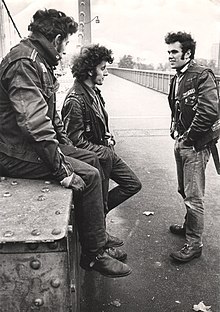Mods and rockers
Mods wore suits and other cleancut outfits, and listened to music genres such as modern jazz, soul, Motown, ska and British blues-rooted bands like the Yardbirds, the Small Faces, and later the Who and the Jam.
[2] BBC News stories from May 1964 stated that mods and rockers were jailed after riots in seaside resort towns in Southern England, such as Margate in Kent, Brighton in Sussex, and Clacton in Essex.
The magazine Police Review argued that the mods and rockers' purported lack of respect for law and order could cause violence to "surge and flame like a forest fire".
[7] As a result of this media coverage, two British members of parliament travelled to the seaside areas to survey the damage, and MP Harold Gurden called for a resolution for intensified measures to control hooliganism.
[9] He concedes that mods and rockers had some fights in the mid-1960s, but argues that they were no different from the evening brawls that occurred between youths throughout the 1950s and early 1960s at seaside resorts and after football games.
[10] Cohen argues that as media hysteria about knife-wielding mods increased, the image of a fur-collared anorak and scooter would "stimulate hostile and punitive reactions".
The 1979 film Quadrophenia starring Phil Daniels as Jimmy, Leslie Ash as Steph and Sting the lead singer of the English band Police as Ace Face, is set against the background of the 1964 Brighton clash with the incident featuring prominently.

